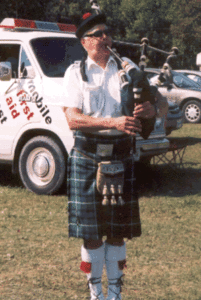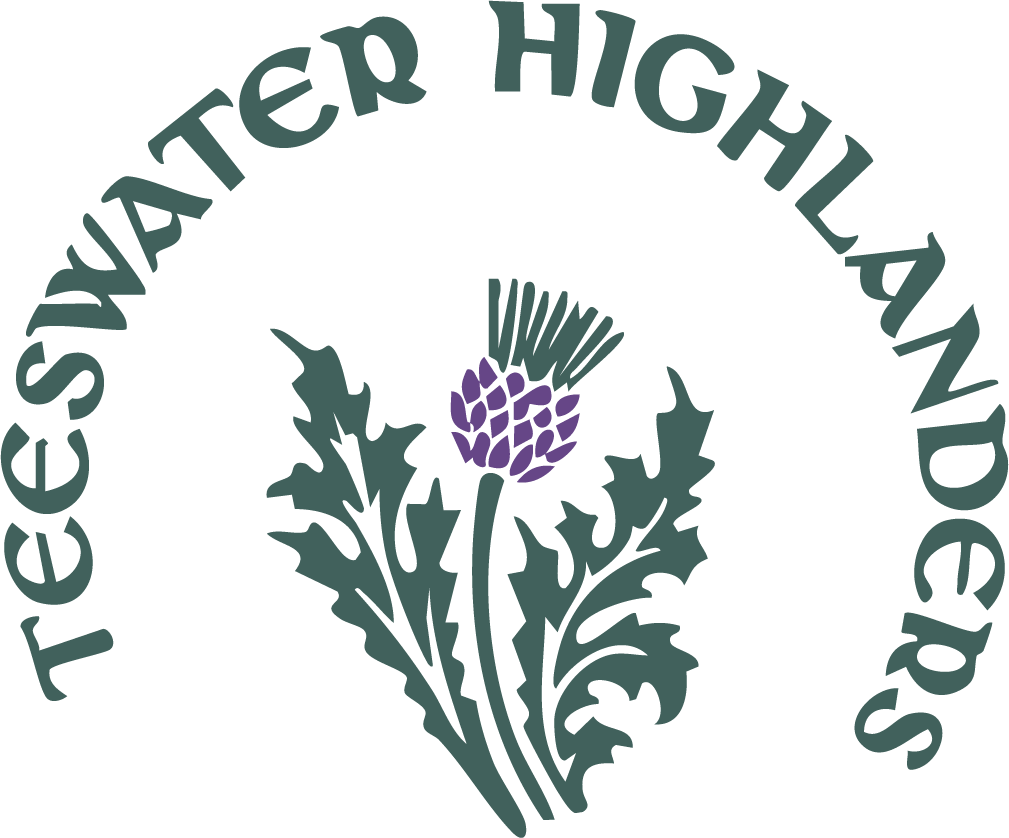Pipe Major K. Bruce MacDonald
1944-2020

K. Bruce MacDonald Memorial Scholarship
This annual award has been created by the Teeswater Highlanders Pipe Band to recognize the tireless efforts of Pipe Major K. Bruce MacDonald to teach, promote and perform the music of the Great Highland Bagpipes across Canada.
The annual scholarship value is $500. The award is administered by the Teeswater Highlanders Pipe Band.
Eligibility is open to anyone currently playing with a pipe band in Ontario, or anyone who has been actively engaged in efforts to improve their skills as a piper or a drummer for at least two years. They must demonstrate a desire to continue to advance their proficiency. Preference will be given to individuals who have a record of participating in community performances or highland games. The award is meant to assist those who may need financial assistance to offset costs associated with improving their skills. Award winners must wait five years to reapply.
Types of eligible costs include attendance at bagpipe or drumming schools, mini-courses, and private or group lessons. The first $500 of eligible cost will be reimbursed to the award winner, subject to verification.
Applicants will submit a completed application form by email to the Teeswater Highlanders by August 31st of each year. The Teeswater Highlander Band will review all applications and announce a single recipient at the Fall Champion Supreme Ceilidh of the Pipers and Pipe Band Society of Ontario (PPBSO).
Click here to display the application form in a new window. Print a copy of the form, complete it, and either mail it to: J. Rutherford, PO Box 187, Wingham ON N0G 2W0, or return an image of it via email to the address at the bottom of the form.
Biography

Dr. Kenneth Bruce MacDonald was born in Bruce County, Ontario in 1944. His parents, Kenneth and Hazel MacDonald, farmed on Concession 8, Culross Township, northwest of the Village of Teeswater. The Township and Village are now part of the Municipality of South Bruce.
Bruce was introduced to music at an early age. His mother was a piano teacher and taught him to play. During his life he took up other instruments including the guitar and the penny whistle. His parents, being Scottish, wanted him to learn to play the bagpipes. His first piping instructor was Frank Mackenzie who lived in the nearby village of Lucknow.
Growing up on his parent’s farm, Bruce improvised ways to find practice time while doing his chores. On summer evenings he would go to the back pasture and begin playing the pipes. The cows would follow him back up the lane to the barn. The sight and sound of this interesting procession provided enjoyment for the neighbours.
Bruce’s next instructor was William (Bill) Millar. Bill emigrated from Ireland to London Ontario, then to the Town of Goderich. He was the primary piping instructor in the area at the time. Bruce also began playing in the Goderich Pipe Band under PM Millar.
In 1960, at the age of sixteen, Bruce was asked to pipe an honour guard down the street for the Teeswater Remembrance Day Service. Some attendees, moved by the sound of the young piper, decided it was time the Village had its own pipe band. They began the process to attract and teach pipers and drummers, and to raise money for the creation of a band. The Teeswater Highlanders Pipe Band was established in 1961.
The band began competing in 1964, winning their C1 class at the Fergus Highland Games that summer. In the summer of 1965, the band won their class at the Embro, Dutton and Fergus Highland Games.
The Pipe Major of the Teeswater Highlanders at the time was Ronald Lamont, but local newspaper accounts noted that Bruce was Acting Pipe Major for the band competitions. There were also some newspaper reports of Bruce entering solo piping competitions around this time. He placed first in the 21 years and under March class at the Goderich Indoor Games and won a gold medal in the Open Class at the Stratford Indoor Games.
In the 1960’s, Bruce was an Agricultural undergraduate and graduate student at the University of Guelph. For some of this time, he was the Pipe Major of the Teeswater Highlanders, which would have necessitated weekly trips between Guelph and home. He also began playing with the Guelph Pipe Band under Pipe Major Ed Neigh.
In December 1970, as he was completing his Ph.D., he resigned as the Pipe Major of the Teeswater band, but continued to offer his services as instructor for band beginners and senior members.
In 1971, Bruce left Guelph (and both pipe bands) to take up a new position in Saskatoon. From 1971 to 1974, he was an Assistant Professor in the Saskatchewan Institute of Pedology at the University of Saskatchewan. In 1975, he became the Canadian Director of the Potash Institute of Canada. While living in Saskatoon, he joined the North Saskatchewan Regiment Band and helped create the Saskatoon Boy’s Pipe Band, in which he served as Pipe Major until 1976.
In 1977, he moved to Ottawa, becoming Head of Canada Soil Information System and Land Evaluation with Agriculture and Agri-Food Canada. While in Ottawa he played with the Air Command Pipes and Drums, CFB Ottawa. William (Bill) Gilmour was the Pipe Major.
Bruce often represented Canada as a piper. In 1981, he played with the R.C.A.F. Rockcliff Pipes and Drums, Ottawa (now the Royal Canadian Air Force Pipes and Drums), at the Edinburgh Tattoo.
In 1985, he piped Prime Minister Mulroney into the White House in when the Prime Minister met with Vice-President George H.W. Bush. He was chosen to pipe at the 75th Vimy Memorial Anniversary Service in France in 1991, with Queen Elizabeth and Prime Minister Mulroney in attendance. For many years he was the official piper at the University of Guelph. One of his duties was playing for hours of graduate processionals during convocation week. He liked to challenge himself to play as many different 6/8 tunes as possible without repeating any.
In 1992 he moved back to Guelph as Head of the Ontario Land Resources Unit of Agriculture and Agri-Food Canada. He again joined the Guelph Pipe Band, becoming the Pipe Major of the Grade 4 Guelph Pipe Band. He led them to and several awards including the Grade 4 North American Grand Championship Supreme in 2003.
In 1998, Bruce retired from civil service but continued on with his own consulting practice in soil science, GIS, and environmental quality. At the same time, he once again took on the role of Pipe Major of the Teeswater Highlanders, reinvigorating the band by bringing in new students and new pipers. The band did not compete during this time, but there was always a determination to be the best street band possible with good sound, constantly improving technique and an ever-refreshing repertoire.
For some time, Bruce served as Pipe Major of both the Guelph and Teeswater Pipe Bands. Eventually, he relocated back to the family farm outside Teeswater, continuing to serve as the Pipe Major and instructor for the Teeswater Highlanders until his sudden death in a car accident in February, 2020.
Bruce demonstrated strong leadership qualities throughout his professional life and piping career. However, his major contribution to Canadian piping may have been as a teacher. It would be difficult to estimate the thousands of hours he spent teaching individuals and bands across the country. Many of those hours were volunteer. If he asked a small fee to teach new band pipers, he donated the fee back to the band for reed purchases.
He continued to take on new students of all ages and abilities, and never dissuaded any student for striving to improve. Some of his students went on to become accomplished pipers, teachers and leaders in their own right. He also served as an adjudicator for the Pipers and Pipe Band Society of Ontario (PPBSO). As an adjudicator he was described as clear, direct and fair by competitors. He always believed in the importance of strong fundamentals and precise execution.
Bruce is fondly remembered by his many colleagues, students, and friends. His contributions to the piping community and his love of teaching piping will be remembered and honoured through this scholarship.

